
Since its establishment in 1947, Pakistan has had an asymmetric federal government and is a federal parliamentary democratic republic. At the national level, the people of Pakistan elect a bicameral legislature, the Parliament of Pakistan. The parliament consists of a lower house called the National Assembly, which is elected directly, and an upper house called the Senate, whose members are chosen by elected provincial legislators. The head of government, the Prime Minister, is elected by the majority members of the National Assembly and the head of state, the President, is elected by the Electoral College, which consists of both houses of Parliament together with the four provincial assemblies. In addition to the national parliament and the provincial assemblies, Pakistan also has more than five thousand elected local governments.
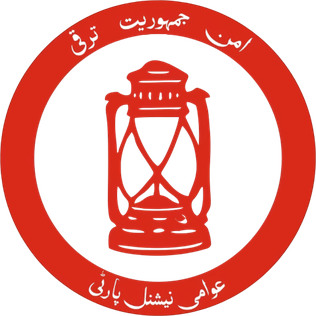
The Awami National Party is a Pashtun nationalist, secular and leftist political party in Pakistan. The party was founded by Abdul Wali Khan in 1986 and its current president is Asfandyar Wali Khan, grandson of Bacha Khan, with Mian Iftikhar Hussain serving as the Secretary-General. Part of the PPP-led cabinet of the Pakistani government during 2008−13, ANP's political position is considered left-wing, advocating for secularism, public sector government, and social egalitarianism.
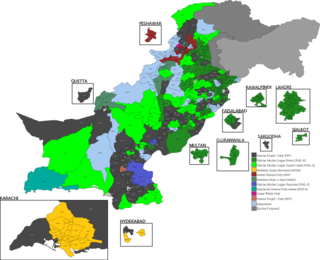
General elections were held in Pakistan on 18 February 2008 to elect members of the 13th National Assembly and the four Provincial Assemblies.

An indirect presidential election was held on 6 September 2008 in Pakistan. The Electoral College of Pakistan – a joint sitting of the Senate, National Assembly and Provincial Assemblies – elected a new president after the resignation of President Pervez Musharraf. As required by the constitution, Muhammad Mian Soomro automatically became acting president on 18 August 2008, upon the resignation of Musharraf. The constitution required that a new president be elected by Parliament within 30 days; Soomro was considered loyal to Musharraf, and it was considered certain that he would be replaced in that election.

Jamiat Ulema-e-Islam Pakistan (Fazl) also Jamiat Ulema-e-Islam (F) or simply as Jamiat Ulema-e-Islam is a Deobandi Sunni political party in Pakistan. Established as the Jamiat Ulema-e-Islam in 1945, it is the result of a factional split in 1988, F standing for the name of its leader, Fazal-ur-Rehman.

General elections were held in Pakistan on Wednesday, 25 July 2018 to elect the members of 15th National Assembly and the four Provincial Assemblies.

Presidential elections were held on 30 July 2013 in Pakistan to elect the 12th President of Pakistan. Incumbent President Asif Ali Zardari’s term was scheduled to expire on 8 September 2013; and as such, Article 41 of the Constitution of Pakistan required the elections to be held no later than 8 August 2013. The Electoral College of Pakistan – a joint sitting of the Senate, National Assembly and Provincial Assemblies – were tasked with electing a new president to succeed President Zardari, who declined to seek a second term in office. After the Pakistan Peoples Party and its allies boycotted the presidential election, the two candidates were Mamnoon Hussain backed by the Pakistan Muslim League (N), and Wajihuddin Ahmed backed by Pakistan Tehreek-e-Insaf. Agra-born Hussain was elected president by a majority securing 432 votes. The elections were the first time in Pakistani history where a civilian president was elected while an incumbent civilian President was still in office, completing a historic and democratic transition of power that began with the 2013 General Elections.
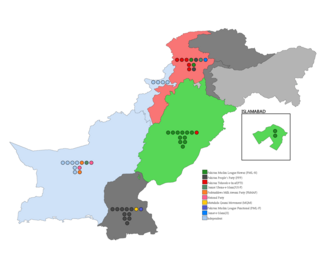
The triennial Senate Electionsof Pakistan were held on 3 March 2018 to replace 52 retiring senators - half of the Senate's strength - with the winning candidates serving six-year terms. Overall, Pakistan Muslim League (N) came out as the largest party, followed by the Pakistan Peoples Party and the Pakistan Tehreek-e-Insaf. The results of these elections were steeped in controversy due to rampant allegations of horse trading and vote-buying, which lead to the Prime Minister and opposition leader Imran Khan calling for reforms. Prior to this election, PML (N) candidates were declared as independents by the Election Commission of Pakistan owing to a Supreme Court judgment.
Muhammad Tariq Khattak is a Pakistani politician who had been a member of the National Assembly of Pakistan from 2008 to 2013. He had been a member of the Khyber Pakhtunkhwa Assembly from 2002 to 2007.
Laiq Muhammad Khan is a Pakistani politician who had been a member of the National Assembly of Pakistan from 2010 to 2013.

Provincial elections were held in the Pakistani province of Khyber Pakhtunkhwa on 11 May 2013, alongside nationwide general elections and three other provincial elections in Sindh, Balochistan and Punjab. The remaining two territories of Pakistan, Azad Kashmir and Gilgit-Baltistan, were ineligible to vote due to their disputed status.
Dilawar Khan is a Pakistani politician who has been a Member of the Senate of Pakistan, since March 2018.
Heer Sohoo is a Pakistani politician who had been a Member of the Provincial Assembly of Sindh, from 2002 to May 2018.

Provincial elections were held in Khyber Pakhtunkhwa on 25 July 2018 to elect the members of the 11th Provincial Assembly of Khyber Pakhtunkhwa
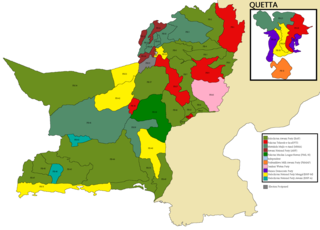
Provincial elections were held in the Pakistani province of Balochistan on 25 July 2018.
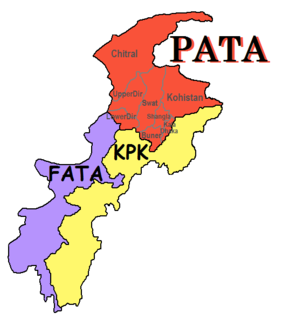
The Twenty-fifth Amendment of the Constitution of Pakistan, officially known as the Constitution Act, 2018, was passed by the Parliament of Pakistan and the Khyber Pakhtunkhwa Assembly in May 2018. Under the amendment, the Federally Administered Tribal Areas (FATA) and Provincially Administered Tribal Areas (PATA) are to be merged with the province of Khyber Pakhtunkhwa (KP).

Provincial elections were held in constituencies of Khyber Pakhtunkhwa belonging to areas previously known as the Federally Administered Tribal Areas (FATA) on 20 July 2019. After the election, the new members joined the already elected members from the rest of the province to complete the formation of 11th Provincial Assembly of Khyber Pakhtunkhwa.
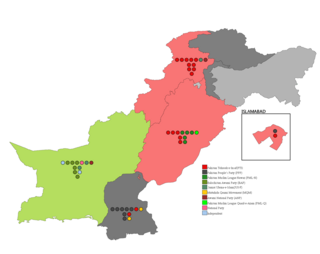
The 2021 Pakistani Senate election was held on 3 March 2021. The Election commission of Pakistan announced the election schedule on 11 February 2021. 52 of the 104 Senators had retired on 7 February 2021. After the merger of the Federally Administered Tribal Areas with Khyber Pakhtunkhawa, FATA seats were abolished and there will be no election on 4 of the 8 seats. The rest of the 4 seats will also not be renewed in 2024. Official results of the Senate Elections were announced by the Election Commission of Pakistan on 10 March 2021.
Elections in Khyber Pakhtunkhwa, a province of Pakistan are conducted in accordance with the Constitution of Pakistan. The Assembly of Khyber Pakhtunkhwa creates laws regarding the conduct of local body elections unilaterally while any changes by the Provincial Assembly to the conduct of Provincial elections need to be approved by the Parliament of Pakistan. Election Commission of Pakistan is responsible of conducting Elections in Khyber Pakhtunkhwa.
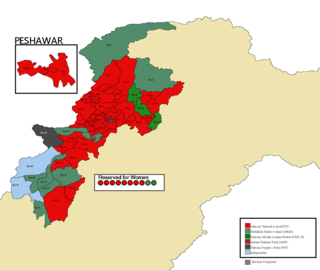
General elections were held in Khyber Pakhtunkhwa on Wednesday, 25 July 2018 to elect the 51 members of 15th National Assembly from Khyber Pakhtunkhwa.



















